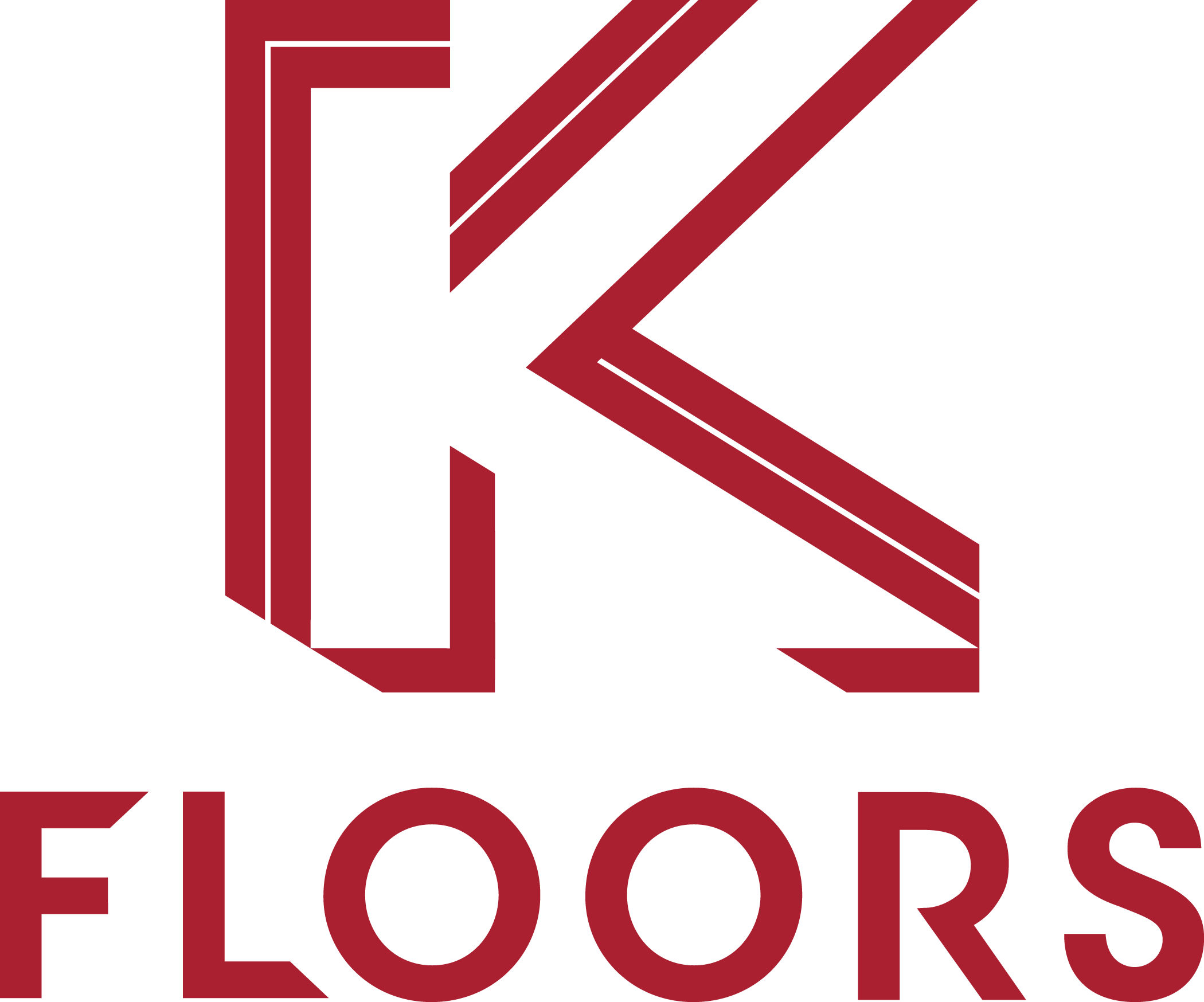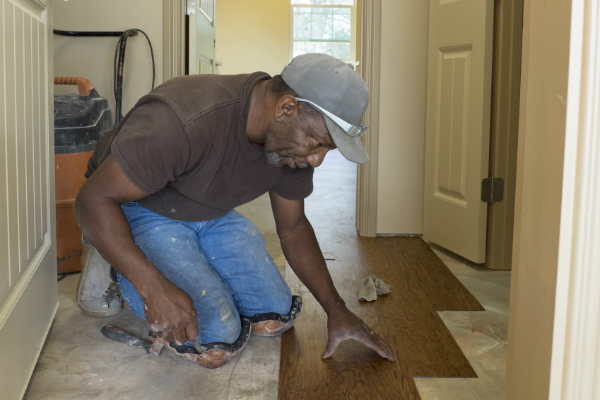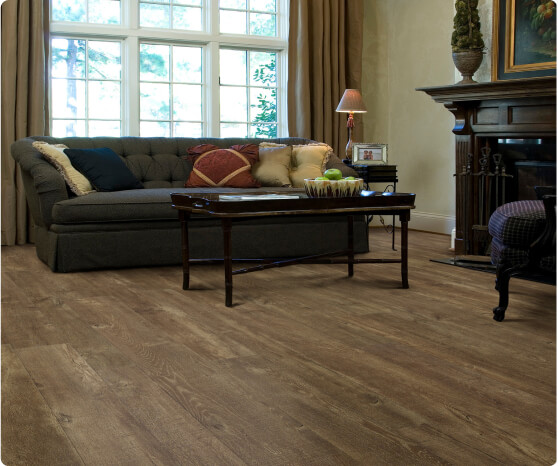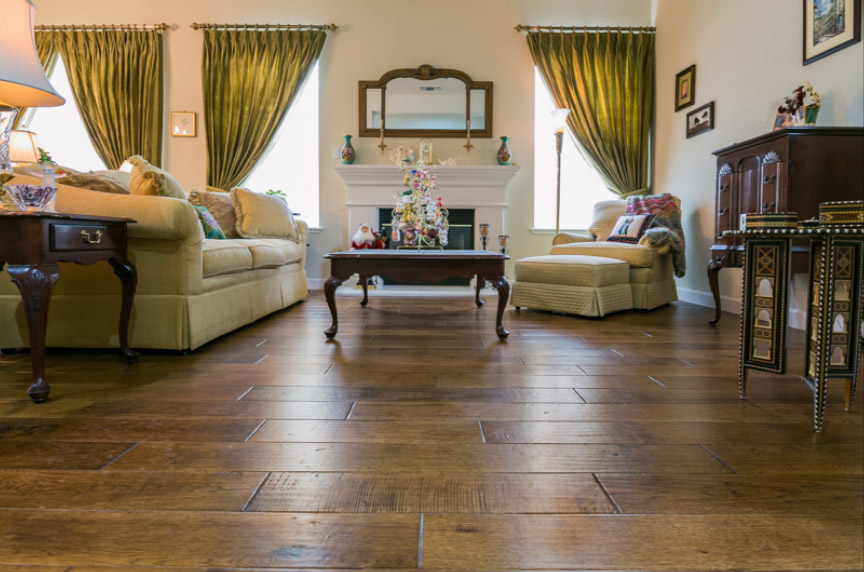Vinyl flooring has rapidly emerged as the preferred choice for homeowners, and its popularity can be attributed to a combination of versatility and affordability. Crafted from synthetic materials such as polyvinyl chloride (PVC), vinyl floors boast a remarkable blend of resilience and water resistance, rendering them well-equipped to endure the rigors of daily life. However, the appeal of vinyl flooring extends beyond its durability, as it presents an extensive range of styles, including remarkably authentic wood and tile replicas. This diversity allows homeowners to meticulously tailor their flooring to achieve the desired aesthetic for any given space.
One of the standout features of vinyl flooring lies in its ability to replicate the appearance of pricier materials like hardwood or ceramic tiles, offering an enticing compromise between opulence and budget-consciousness. High-quality vinyl flooring options, such as luxury vinyl planks and tiles, emulate the look and feel of traditional hardwood or ceramic, delivering a sophisticated ambiance without the exorbitant costs associated with genuine materials. This characteristic makes vinyl flooring an ideal solution for those seeking to enhance various areas of their home, whether it’s the bustling kitchen, the moisture-prone bathroom, or any other living space.
The financial advantages of vinyl flooring are particularly noteworthy. Homeowners can embark on a flooring upgrade without compromising on style or performance, as vinyl provides an economical yet visually appealing solution. Whether you’re aiming to revitalize a specific room or embark on a comprehensive home improvement project, vinyl flooring stands out as a cost-effective choice that seamlessly marries aesthetics with functionality.
Vinyl flooring emerges as a versatile and budget-friendly alternative for homeowners seeking a durable, water-resistant, and aesthetically pleasing flooring option. With its ability to mimic the appearance of high-end materials, vinyl flooring, especially in the form of luxury vinyl planks and tiles, has become a cornerstone in the realm of cost-effective yet stylish home renovations.
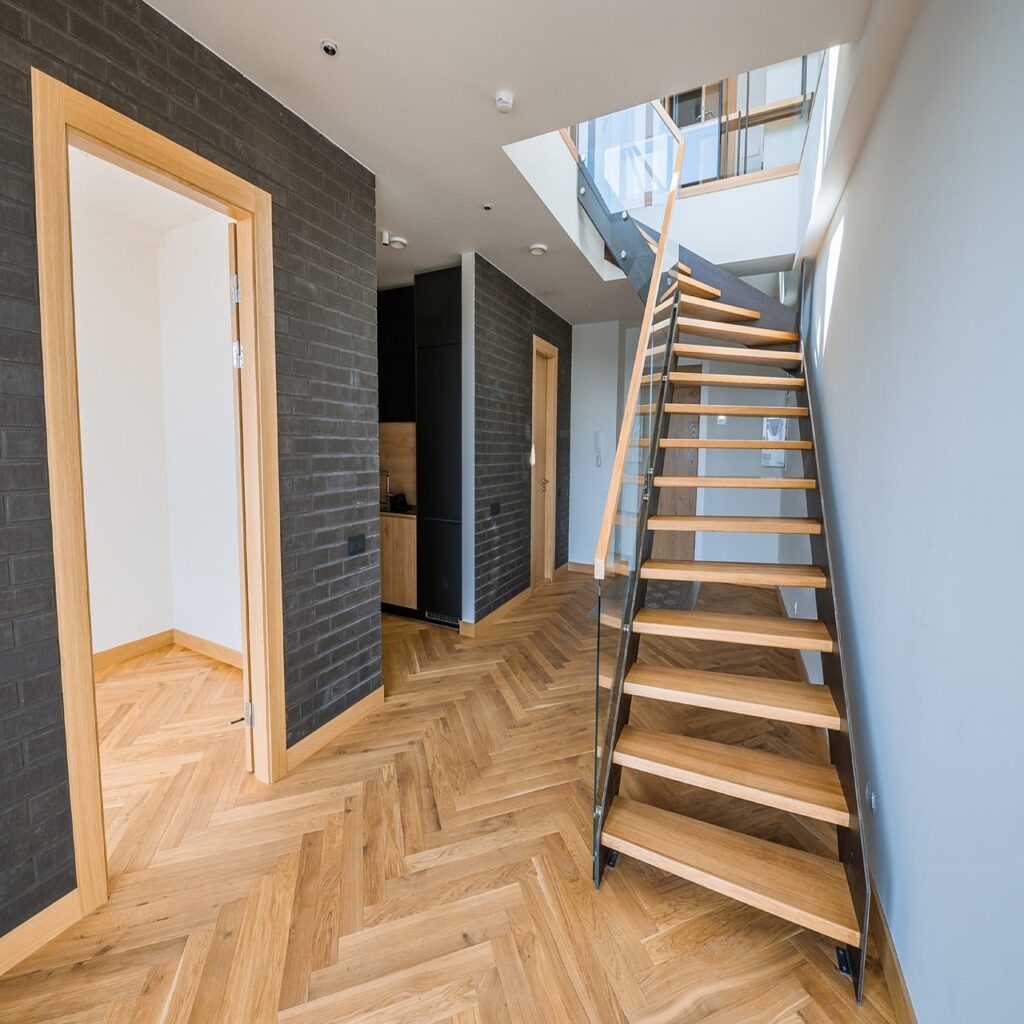
Table of Contents
ToggleExploring the Pros and Cons of Vinyl Flooring
Pros of Vinyl Flooring:
- Exceptional Durability: Vinyl flooring stands out for its robustness, with a notable ability to resist wear and tear. This durability is particularly advantageous in high-traffic areas, such as kitchens and hallways, where it can endure the impact of heavy furniture and foot traffic without displaying visible damage.
- Ease of Cleaning and Maintenance: Maintaining vinyl flooring is a straightforward task. Unlike some alternative flooring options, vinyl does not demand specialized cleaners or treatments. Regular sweeping or vacuuming, coupled with occasional mopping using mild soap and water, is generally sufficient to preserve the cleanliness and freshness of vinyl floors.
- Moisture and Stain Resistance: Vinyl’s resistance to moisture and stains is a key benefit, making it an ideal choice for areas prone to spills or moisture, like bathrooms and laundry rooms. The waterproof properties of vinyl help prevent water damage, adding a practical dimension for households with children or pets.
Cons of Vinyl Flooring:
- Susceptibility to Scratches and Dents: A notable drawback of vinyl flooring is its susceptibility to scratches and dents over time. The dragging of heavy furniture or sharp objects across the surface can leave marks that may prove challenging to repair, impacting the aesthetic appeal of the flooring.
- Potential VOC Emissions: Some types of vinyl flooring may release volatile organic compounds (VOCs), gases that can have adverse health effects when inhaled in concentrated amounts. To mitigate this concern, it is advisable to opt for low-VOC or phthalate-free vinyl options, prioritizing indoor air quality.
- Comparatively Shorter Lifespan: While properly installed and maintained vinyl floors can endure for numerous years, they generally have a shorter lifespan compared to alternatives like hardwood or tile. This consideration is essential for homeowners contemplating long-term investments in flooring materials.
Despite the potential drawbacks, many homeowners favor vinyl flooring due to its array of benefits. When deciding on flooring options, it’s crucial to carefully assess individual needs and preferences to determine whether the advantages of vinyl outweigh the disadvantages for a specific living environment.
Vinyl Flooring: Lifespan and Economic Considerations
Lifespan of Vinyl Flooring
The durability of vinyl flooring is subject to various factors, with the foremost being the quality of the material. Opting for higher-quality vinyl flooring enhances its resilience and longevity in comparison to lower-quality alternatives. It is imperative to select a reputable brand or supplier that provides top-notch vinyl flooring.
Maintenance is another pivotal determinant of vinyl flooring’s lifespan. Regular cleaning and proper care play a significant role in extending the longevity of vinyl floors. Consistent sweeping or vacuuming, coupled with prompt spill cleanup, helps prevent stains, scratches, and other potential damages that could curtail the flooring’s overall lifespan.
Foot traffic is a critical consideration as well. High-traffic areas within a residence, such as hallways or entryways, are prone to more wear and tear. Consequently, it is essential to choose a type of vinyl flooring that can endure heavy foot traffic, especially in areas expected to be frequently used.
Cost-Effectiveness of Vinyl Flooring
One notable advantage of vinyl flooring is its affordability compared to alternatives like hardwood or tile. Vinyl flooring is generally priced lower, making it an ideal choice for homeowners on a budget seeking a cost-effective yet stylish flooring option.
Unlike hardwood or tile, which may involve a substantial upfront investment, vinyl flooring offers cost savings in terms of both material costs and installation expenses. The ease of installation makes vinyl floors conducive to do-it-yourself (DIY) projects, allowing homeowners to save money by opting for self-installation instead of hiring professionals.
Considering the long-term value and cost-effectiveness is crucial when evaluating different flooring materials. Vinyl floors are renowned for their durability, and resistance to stains, scratches, and moisture damage. This durability translates into minimal maintenance requirements over time, potentially resulting in savings on repair and replacement costs.
Comparing Vinyl to Other Flooring Types: Enhanced Moisture Resistance and Effortless Maintenance Compared to Hardwood Flooring
Vinyl flooring presents numerous advantages over hardwood flooring, with a key feature being its exceptional moisture resistance. In contrast to hardwood, which may deform or swell when exposed to moisture, vinyl exhibits a high resistance to water damage. This quality makes it an ideal choice for areas prone to spills or elevated humidity, such as kitchens, bathrooms, and basements.
Moreover, maintaining vinyl flooring is notably simpler than caring for hardwood. While hardwood floors demand regular polishing and refinishing to preserve their appearance, vinyl only necessitates straightforward cleaning with a damp mop or mild cleanser. This simplicity makes vinyl a more convenient option, particularly for busy households or individuals seeking low-maintenance flooring.
Sturdier and Healthier Alternative to Carpets
When compared to carpets, vinyl flooring emerges as a more durable and allergy-friendly choice. Carpets are susceptible to wear and tear, especially in high-traffic areas, while vinyl boasts resistance to scratches, stains, and dents due to its robust protective layer.
Carpets can harbor allergens like dust mites, pet dander, and pollen, posing a risk to sensitive individuals. In contrast, vinyl flooring eliminates this concern by not trapping allergens like carpets do. Keeping vinyl floors clean and free from potential allergens is as simple as regular sweeping or vacuuming.
Cost-Efficient Imitation of Natural Stone or Ceramic Tile
Vinyl flooring serves as a cost-effective alternative that convincingly mimics the appearance of natural stone or ceramic tile, all at a fraction of the cost. Genuine stone or tile floors can be prohibitively expensive due to the materials and installation expenses involved. However, thanks to technological advancements, vinyl flooring can replicate the look of these premium options without straining the budget.
Available in various designs and styles closely resembling natural stone textures or ceramic tile patterns, vinyl allows homeowners to achieve their desired aesthetic without incurring a substantial expense. Additionally, the ease and speed of vinyl installation compared to stone or tile contribute to both time and cost savings.
The Environmental Impact of Vinyl Flooring and Sustainable Alternatives
While vinyl flooring remains a popular choice among homeowners for its durability, affordability, and diverse designs, concerns have been raised regarding its environmental impact. The production and disposal of vinyl floors have faced criticism due to their association with fossil fuel usage and the emission of volatile organic compounds (VOCs), contributing to air pollution and potential health risks.
To address these environmental concerns, some manufacturers are actively taking steps to minimize the negative impact of vinyl flooring. One significant approach involves incorporating recycled materials into the production process. By utilizing recycled PVC or other recycled plastics, manufacturers aim to reduce the reliance on new raw materials and decrease overall waste.
Moreover, efforts are being made to improve recycling programs specifically tailored to vinyl flooring. Manufacturers are establishing partnerships with recycling facilities to create a more sustainable cycle. This involves the collection and processing of old vinyl floors, transforming them into new products. This not only alleviates the burden on landfills but also conserves resources through the reuse of materials.
For those who prioritize sustainability, exploring eco-friendly alternatives is advisable. Luxury vinyl tiles (LVT) made from recycled materials emerge as an excellent option. These tiles mimic the aesthetic of natural materials like wood or stone, offering a stylish yet environmentally conscious flooring solution. Choosing LVTs made from recycled materials not only helps reduce waste but also supports a more sustainable approach to flooring.
As environmental awareness grows, manufacturers are actively working to mitigate the environmental impact of vinyl flooring through the use of recycled materials and improved recycling programs. For consumers, opting for eco-friendly alternatives like recycled LVTs provides a sustainable and stylish choice for flooring in their homes.
Evaluating the Influence on Property Value
Vinyl Flooring: Enhancing Home Value
The rising popularity of vinyl flooring among homeowners is attributed to its appealing aesthetics and easy maintenance. It is vital to recognize the positive contributions it can make to your home.
A notable advantage of vinyl flooring lies in its capacity to elevate the overall visual appeal of a residence. With an extensive array of colors, patterns, and designs, vinyl floors can seamlessly complement any interior style or theme. Whether one leans towards a timeless wood appearance or a lively tile pattern, the versatility of vinyl adds a touch of refinement to the living space.
Additionally, the low-maintenance nature of vinyl flooring sets it apart from other materials. Its robust composition makes it resistant to stains, scratches, and moisture damage. This translates to homeowners enjoying an attractive floor without the burden of constant upkeep or expensive repairs. Consequently, this convenience enhances the attractiveness of your home to potential buyers.
Consideration for Discerning Buyers
While vinyl flooring offers numerous benefits, it is crucial to recognize that high-end buyers may have distinct preferences. Some individuals may prioritize natural materials such as hardwood or stone, perceiving them as luxurious and durable.
However, this doesn’t mean that vinyl flooring is automatically excluded for these buyers. Advancements in technology have led to the creation of high-quality luxury vinyl tiles (LVT) and planks (LVP) that closely emulate natural materials like hardwood or stone. These premium options strike an excellent balance between aesthetics and practicality.
Influence of Market Trends and Preferences
To gauge the positive impact of vinyl flooring on your home’s value, it is imperative to consider local market trends and preferences. Real estate markets exhibit variations from one region to another, with distinct buyer demographics and tastes influencing property values.
Conduct thorough research on local housing trends and seek guidance from real estate professionals familiar with your area. Their insights can offer valuable information on the types of flooring materials that resonate with buyers and contribute positively to home values. By aligning your choices with market preferences, you can optimize the potential return on investment for your property.
Conclusion
In conclusion, vinyl flooring emerges as a compelling choice for numerous homeowners, boasting an array of advantages that render it a viable option for diverse circumstances. Its durability and cost-effectiveness form a dynamic duo, rendering it particularly appealing for individuals navigating financial constraints or grappling with high-traffic areas within their homes. The appeal of vinyl further extends to its adaptability in design, presenting homeowners with a canvas for customization that seamlessly aligns with their chosen style or aesthetic preferences.
However, amidst the allure of vinyl flooring, a conscientious homeowner must not overlook the potential environmental ramifications associated with its production and disposal. While vinyl stands out for its low maintenance requirements and commendably long lifespan, its ecological footprint cannot be dismissed. It becomes imperative, then, to engage in a thoughtful comparison with alternative, more eco-friendly flooring materials. By considering the environmental impact, one can make an informed decision that not only caters to personal preferences and practical considerations but also aligns with a broader commitment to sustainability.
In the quest to determine the appropriateness of vinyl flooring, a judicious approach involves a careful examination of one’s specific needs, financial constraints, and overarching values. Seeking counsel from industry professionals proves invaluable, as their expertise can shed light on tailored solutions aligned with the unique circumstances of a given space. In essence, the decision-making process extends beyond mere aesthetics and practicality; it encompasses a holistic consideration of environmental responsibility.
In crafting a living space that seamlessly combines beauty and functionality while minimizing ecological impact, the onus lies on the homeowner to make well-informed choices. By weighing the benefits of vinyl against its environmental drawbacks and exploring eco-friendly alternatives, individuals can pave the way for a home that not only meets their immediate needs but also contributes to a sustainable and responsible future.
Sources:
- /home-improvement/flooring/hardwood-flooring-pros-cons/
- /home-improvement/bathroom/bathroom-remodel-cost/
- /home-improvement/flooring/install-vinyl-plank-flooring/
- /carpet-warranties/
Looking for the Perfect Vinyl Flooring? Discover Your Match at K Floors in Concord, California!
K Floors isn’t just a flooring company; we’re your partners in creating spaces that embody quality and style. Our diverse range of vinyl flooring options, from luxury vinyl to waterproof styles and vinyl planks, caters to every taste and need. Experience the K Floors difference. Our expert team is here to guide you, offering complimentary in-home consultations and a selection sourced from top vinyl suppliers. Explore our extensive collection and find not just a floor, but a reflection of your unique vision.
At K Floors, we blend traditional craftsmanship with modern design, ensuring every vinyl floor we install makes your space feel truly like home. Whether for residential or commercial projects, we’re committed to quality and authenticity. Visit us in Concord, California, and start your journey to the ideal vinyl flooring with K Floors.
Disclaimer
The materials available on this website are for informational and entertainment purposes only and not to provide legal advice. You should contact your attorney to obtain advice concerning any particular issue or problem. You should not act or refrain from acting based on any content included in this site without seeking legal or other professional advice. The information presented on this website may not reflect the most current flooring developments. No action should be taken in reliance on the information contained on this website and we disclaim all liability concerning actions taken or not taken based on any or all of the contents of this site to the fullest extent permitted by law.
